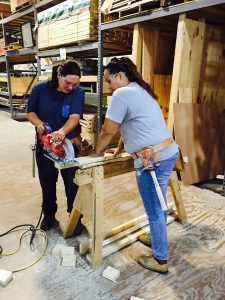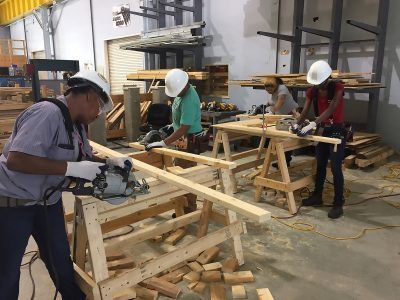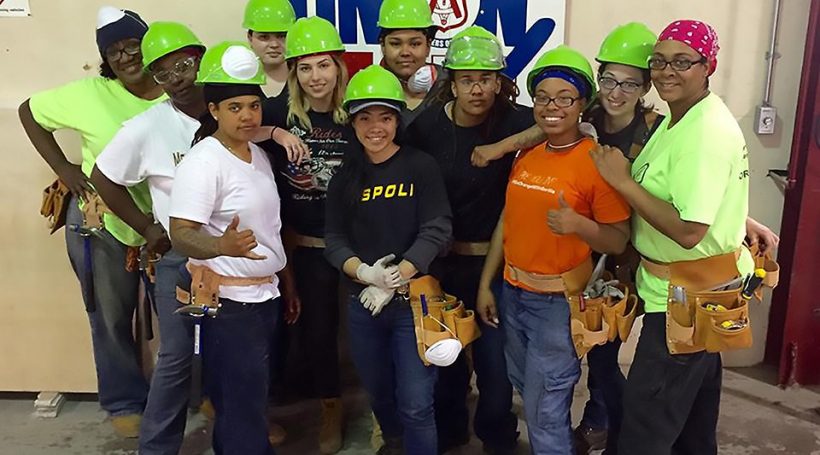When Jennifer Brookins decided to make a career change, she took matters into her own hands – quite literally.
A former drug and alcohol counselor who worked with women coming out of prison, Brookins now spends her days as a pile driver with the Carpenters Local 255 union based in Hammonton.
“We’re building the Christina River Bridge down in Delaware. We have three massive cranes – one in the middle of the water and one on each side of the river – and I operate one of the pile drivers that drives the piles, or poles, into the riverbed for the foundation support of the bridge,” says Brookins, 42. “It’s intense, and some days I come home physically exhausted, but it’s exciting work that I love.”
 Brookins, a single mother of seven living in Clayton, says she had been considering nursing school before joining the union. “I was very committed to my job as a counselor, but I needed a job that would allow me to better care for my family. The cost of nursing school, plus the time commitment, were roadblocks to getting ahead. I was weighing a lot of options when I heard about Sisters in the Brotherhood.”
Brookins, a single mother of seven living in Clayton, says she had been considering nursing school before joining the union. “I was very committed to my job as a counselor, but I needed a job that would allow me to better care for my family. The cost of nursing school, plus the time commitment, were roadblocks to getting ahead. I was weighing a lot of options when I heard about Sisters in the Brotherhood.”
Powered by the United Brotherhood of Carpenters (UBC) union, Sisters in the Brotherhood (SIB) is an increasingly active program that recruits women to join the trades and provides them with craft training and leadership skills. Female members are also supported by mentors and work to advocate for women’s issues in the union through regional SIB councils located across the country.
“What really sold me on joining the Sisters in the Brotherhood program is that it costs nothing – you need to be on time and show up for the six weeks you’re in class, but you’ll learn what you need to earn an apprenticeship and then land a well-paying job in the union,” says Brookins. “Compared to the student loans and hours of homework and time away from my kids I was looking at with nursing school, it was a no-brainer for me.”
“Last year, I was the first female from the Sisters program to be accepted into the Local 255, and it’s been life-changing for me,” she adds. “I’m no longer bringing my job home every night, I’m able to better care for my family financially, I have good benefits for me and my kids, and I have long-term job stability.”
These perks are drawing a growing number of women to the SIB program, says Sue Schultz, who serves as the program’s Eastern District representative. South Jersey women who enroll can choose to learn up-to-date skills in every area of the carpentry trade, including dock building and pile driving, cabinetry and mill working, and floor covering through a mixture of classroom and hands-on instruction at a training facility in Hammonton. After completing the six-week program and an apprenticeship, they can land jobs as foremen, superintendents and instructors on a wide variety of job sites.
“Right now, we have more than 70 women from New Jersey, Pennsylvania, New York, Maryland and Delaware who are part of our regional SIB council, and we’re actively recruiting new members at places like local high schools and vo-tech schools. Our word-of-mouth is also growing,” says Schultz.
“The tide is starting to turn back toward skilled trades, especially as more people don’t want to take on college debt. College isn’t for everyone, and Sisters in the Brotherhood is giving women a chance to earn while they learn, without the huge cost of college.”
Nationwide, thousands of women have completed SIB programs through their local councils, and Schultz says that like Brookins, many of them are single moms.
“Most come in earning minimum wage, and many don’t have jobs that provide benefits for them or their children. They’ve spent years juggling the demands of their jobs and kids, but they haven’t been able to get ahead,” she says. “When they join SIB, we’re teaching them the trade they need to land a job with the union, but we’re also making sure they learn and understand the benefits that come with the job.”
“The pay is excellent – there is no gender pay gap, and most women are suddenly making $19 an hour or more. That type of increase in wages is obviously beneficial for a woman who has been making minimum wage her whole life. But for many women, the biggest way this program and resulting job changes their lives and the lives of their children is that they now have health insurance, as well as a pension and annuity. Those benefits make a marked difference in their quality of life, and they have the power to change the cycle for women who’ve been struggling. The women are thrilled when they realize that, and I see them working to learn everything they can to excel at their jobs, because they know it’s the key to their future.”
 Even after SIB women land a job with the union, they’re encouraged to attend their program council’s quarterly meetings. Women attending those local meetings, as well as SIB national conferences, work together on projects like educating industry leaders and contractors on the benefits of meeting diversity goals, developing programs to help women who are interested in working in construction after leaving the military and constructing women-built Habitat for Humanity houses throughout the United States.
Even after SIB women land a job with the union, they’re encouraged to attend their program council’s quarterly meetings. Women attending those local meetings, as well as SIB national conferences, work together on projects like educating industry leaders and contractors on the benefits of meeting diversity goals, developing programs to help women who are interested in working in construction after leaving the military and constructing women-built Habitat for Humanity houses throughout the United States.
For South Jersey SIB member Queneke King, those meetings have also given women like her the opportunity to discuss the challenges of the job with fellow members and share ideas on how they can open the door to more women.
“The peer-to-peer interaction is great, and we all bring a different perspective. It’s a safe space to share our thoughts,” says King, an Army vet who lives in Mount Holly and now works in marine construction. “We’re making a lot of efforts to bring in more women members, and I like talking to young women in high school who might be considering a job in the trades. I explain that I’ve been there, done that, and I can give them some perspective.”
Schultz, who has been a union carpenter since 1979, says she “couldn’t even imagine there would ever be a program like this when I first joined the union. Back then, it was virtually unheard of to have women be part of the union, and I’d rarely see other women on the job site. Now, it’s not uncommon to see a handful of women.”
Schultz and Brookins both say that most men in the union have been supportive of more women on the job site, especially when the benefits of their presence have been clear.
“This is a male-dominated field, and I knew what I was getting into. There have been a few men who haven’t been crazy about having more women on the job site and have been disrespectful, but the overall response I’ve experienced has been positive,” says Brookins.
“Women are multitaskers, which is a great thing on the job site. Women also tend to be more gentle with the machinery, which means fewer break-downs and less time lost due to repairs. The women I work with also tend to take the time to think things through and make calculated decisions,” adds Brookins.
“And if I don’t know the answer to something, I can ask another woman on the job site for her feedback, because we both have the same goal: to get the job done right.”














